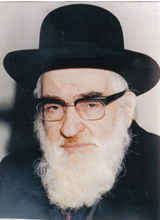Beit Midrash
- Jewish Laws and Thoughts
- Personality Development
- Anava - Humility
- Jewish Laws and Thoughts
- Pathways in Personality Development
- Humility, Holiness and Fearing Hashem
The Torah study is dedicatedto the full recovery of
Yehudah ben Hadasah Hinde Malkah
Additionally, a humble person walks in an unassuming manner. He does not walk with his head held high, and he does not walk in a slow conceited manner. He walks in modesty and does not try to stand out. Walking with a stiff, conceited bearing is comparable to "knocking the feet out from under the Divine presence" (Berachot 43b).
When choosing a place to sit, a humble person does not take a seat amongst the prestigious, but with the common people. The sages say that a person should sit two or three seats behind his seating place and stay there until he is told to advance. In other words, it is better to choose a seat that represents a status lower than one's own and then be asked to advanced than to sit in a more prestigious position and be told to move down.
And the sages teach: "A person should forever learn from the mind of his Creator; for behold, the Holy One blessed be He ignored all the mountains and heights and caused His Divine Presence to abide upon Mount Sinai," and He did this because of its lowliness. And so, we find that humility covers all aspects of a person's behavior, and if a person wishes to acquire humility, he must train himself to speak humbly, walk humbly, and sit humbly.
A humble person knows how to bear insults. The sages say, "They who suffer insults but do not inflict them, who hear themselves reviled and do not answer back . . . of them the Scripture says, 'And they that love him are like the sun when he goes forth in his might.' " A humble person does not need personal honor. He flees honor. And therefore he does not respond when his honor is trampled.
Witness the greatness of Rabbi Baba ben Buta. The Talmud tells about a certain Babylonian Jew who moved to the land of Israel and married there. He asked his wife to cook a particular dish for him, but she misunderstood (because of his Babylonian dialect) and prepared something else. The following day the same thing happened. The man became angry and told her to go and break the bowl of food "on the the head of the baba" ('baba' means 'door' in Aramaic).
Again the woman misunderstood him. She though that he had told her to break the bowl on the head of Baba bar Butta, the great Torah scholar. So she went and broke the bowl on the head of Baba bar Butta while he sat in the study hall adjudicating a certain law case. Baba bar Butta asked her why she did this and she said, "My husband told me to." The rabbi did not become angry. Instead he said to her, "You carried out your husband's request! May God give you two sons like Baba bar Butta."
Not only did Baba bar Butta not become angry at her, he even blessed her. In his great humility he did not become angered. He understood that there must be some mistake here. He was so humble that he was even impressed by the devotion of the woman who was ready to fulfill her husband's request even though it took a lot of courage and did not make much sense. Hillel the Prince was also very humble. All attempts to anger him were unsuccessful. He remained forbearing no matter what happened. Patience is one of the traits that characterize the humble.
-----
Translated biblical verses and/or Talmudic sources in the above article may have been taken from, or based upon, Davka's Soncino Judaic Classics Library (CD-Rom).
49. The Components of Humility
Rabbi Zalman Baruch Melamed | Sivan 5762
IMPUDENCE AND IMPOTENCE
Rabbi Berel Wein zt"l | 5775
45. Conceit and Divine Service
Rabbi Zalman Baruch Melamed






















